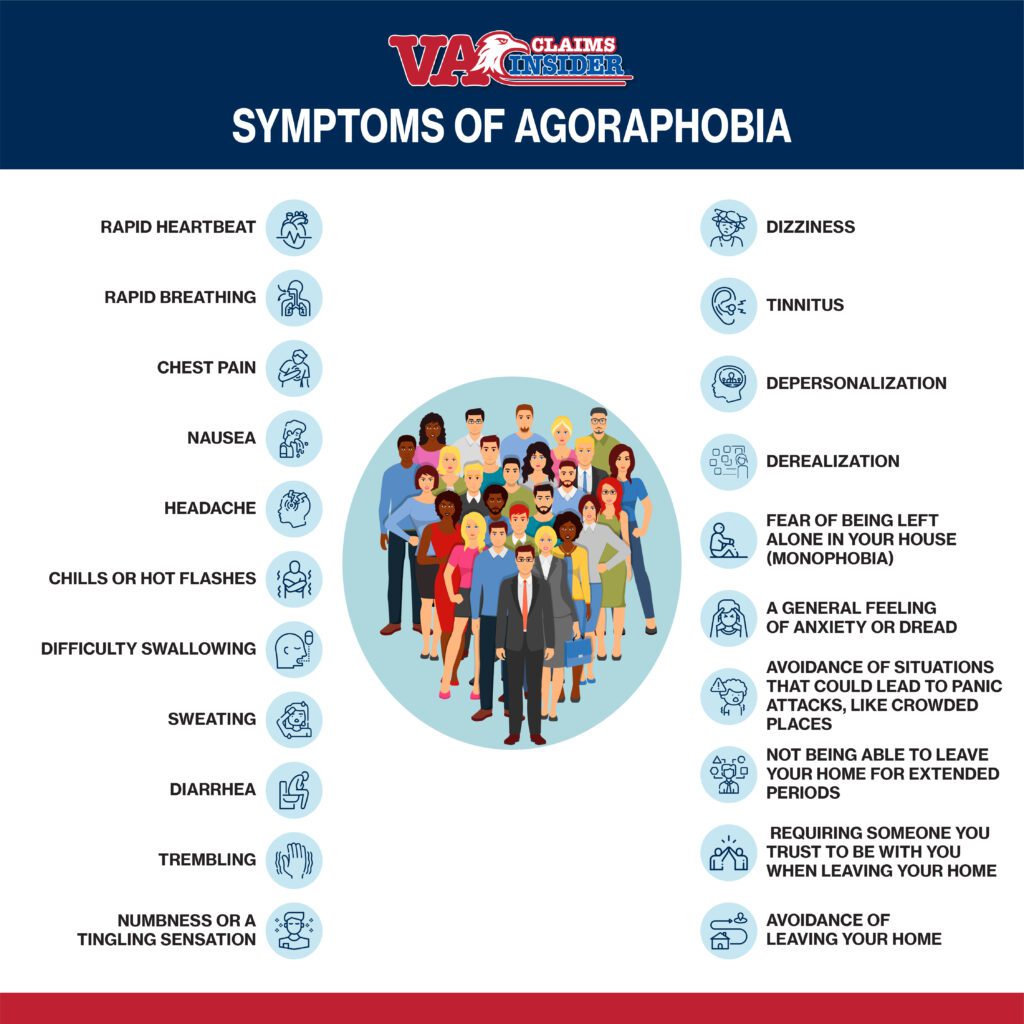Looking for Expert-Level VA Claim Answers?📱Call Us Now! 737-295-2226
For many sufferers of agoraphobia, including veterans, panic attacks can be so debilitating that they cannot leave their homes or even their beds. But getting a VA rating for the condition does not have to be stressful! We’re here to help you navigate the process.
To get an Agoraphobia VA rating, you will need to provide evidence of your condition to the VA. If you provide sufficient evidence, you will likely get your disability service connected, an important part of securing VA benefits.
We are here to help you take the next step on the road to getting the benefits you deserve.

Deserve a Higher VA Rating?
Book a no-obligation VA Claim Discovery Call with an experienced team member. We’ll review your situation, spot what the VA may have missed, and help you map out a strategy to unlock the VA disability rating and tax-free compensation you’ve earned for your service. Click the red button below to book your call.
What Is Agoraphobia?
Agoraphobia is an anxiety disorder that can develop after a traumatic event. Veterans who have experienced combat or other life-threatening situations may risk developing agoraphobia.
Agoraphobia is characterized by a fear of situations or places where escape might be difficult, or help might not be available during a panic attack or other adverse event.
For many people, this fear can lead to avoiding public places, large crowds, and even leaving their homes. While agoraphobia can be extremely distressing, effective treatments can help people manage their symptoms and live full, meaningful lives.
What Type of Disability Is Agoraphobia?
If you experience anxiety in certain situations, like being in crowds or being far from home, you might have agoraphobia. It’s an anxiety disorder that can make it hard to leave your house or feel safe in public.
Agoraphobia is more than just feeling nervous in certain situations. For someone with agoraphobia, the fear is so intense that it gets in the way of their daily life. It can make it hard to work, go to school, or even leave the house to run errands.
In some cases, people with agoraphobia might not even want to leave their house. If you’re experiencing these symptoms, you must talk to a doctor or mental health professional. They can help you understand your options for treatment.
Is Agoraphobia a Permanent Disability?
Agoraphobia is an extreme, irrational fear of situations where escape might be difficult or embarrassing, such as driving on a busy highway or in a crowded mall. It can lead to avoiding activities and places, significantly interfering with daily life. Agoraphobia often in relation to a panic disorder, may include panic attacks. For some patients, the fear of having another attack can become so overwhelming that it leads to avoidance.
For veterans, agoraphobia can be a permanent disability limiting their ability to work and participate in daily activities. It can lead to social isolation and a decrease in quality of life. While there is no cure for agoraphobia, treatment can help people manage their symptoms and live relatively normal lives.
How Are Agoraphobia and Panic Disorders Connected
Agoraphobia, the fear of public places, often exists alongside panic disorders.
Recurrent episodes of anxiety or fear such as agoraphobia can involve panic attacks.
Many people can effectively manage these conditions with medication and/or therapy. However, the symptoms can be so severe for others that they interfere with daily life.
In addition to the stress of readjusting to civilian life, many veterans also have post-traumatic stress disorder (PTSD). The symptoms of PTSD can include anxiety, flashbacks, and avoidance of triggering situations. Veterans are particularly susceptible to both agoraphobia and panic disorders.
How Is Agoraphobia Diagnosed?
Many veterans have PTSD, and the symptoms of agoraphobia can be triggered by the wide-open spaces and crowds often found in public places. As a result, diagnosis and treatment of agoraphobia are often critical for veterans.
A mental health professional usually diagnoses agoraphobia after a thorough evaluation.
If you have agoraphobia, you may be treated with medication, therapy, or a combination of both. The mental health professional will also look for signs of other mental health conditions, such as depression or substance abuse. With treatment, most people with agoraphobia can lead normal, productive lives.
How to Service Connect Your Panic Disorders to Agoraphobia
If you have panic disorders and agoraphobia, you may be entitled to VA disability benefits.
Panic disorders can be tricky to service connect, but if you have a VA disability rating for agoraphobia, the VA may automatically presume that your panic disorder is service-connected. That means you are entitled to VA compensation for agoraphobia, even if your panic disorder is not directly related to your military service.
If you don’t have a VA disability rating for agoraphobia, you can still receive VA benefits for your panic disorder if you show that it is “secondary” to your agoraphobia. To do that, you’ll need to provide evidence that your agoraphobia aggravates your panic disorder.
The VA will consider several factors in determining whether your panic disorder is secondary to your agoraphobia. It can include the severity of your symptoms, whether your symptoms are attributable to panic disorder or some other condition, and whether there is a temporal relationship between the onset of your agoraphobia and the development of your panic disorder.
To be eligible for an anxiety VA rating, a veteran must meet three criteria by law:
- A medical diagnosis of an anxiety disorder in a medical record (Service Treatment Records, VA medical records, or private medical records)
- Your anxiety was caused or made worse by your active-duty military service (“nexus” for service connection)
- Persistent and recurring symptoms of your condition (severity of symptoms)

Does the VA Rate Panic Disorder With Agoraphobia?
The VA does recognize panic disorder with agoraphobia as a disability. It means those suffering from the condition may be eligible for benefits, including mental health treatment and disability compensation.
What Are the VA Diagnosis Codes for Different Anxiety Disorders?
The VA’s diagnostic codes for anxiety disorders are as follows:
- Generalized anxiety disorder (9400)
- Phobias and social anxiety disorder (9403)
- Obsessive-compulsive disorder (9404)
- Other specified anxiety disorders (9410)
- Other unspecified anxiety disorders (9413)
- Post-traumatic stress disorder (9411)
- Panic disorder and/or agoraphobia (9412)
These codes are used to help the VA accurately identify and treat veterans who suffer from anxiety disorders. Anxiety disorders are a genuine and serious issue that can profoundly affect a person’s life.
What Happens if the VA Denies My Agoraphobia VA Claim?
If your initial VA disability claim for panic disorder was denied, don’t despair. You still have the opportunity to appeal. The appeal process can be long and confusing, but it’s important to remember that you are not alone. Many resources are available to help you navigate the appeals process and get the benefits you deserve.
Veterans who want to appeal have three options: Higher-level review, Supplemental, and Appeal to the Board of Veterans’ Appeals.
If you are still not satisfied with the results of your reconsideration, you can file a Notice of Disagreement (NOD). It initiates what is known as a “formal appeal.” You will then have to choose between two review processes: the Veterans Court of Appeals or the Board of Veterans’ Appeals. Each has its strengths and weaknesses, so it’s essential to consult with an experienced attorney before making your decision.
The appeals process can be complicated and frustrating, no matter your route. But if you stay positive and keep fighting, you increase your chances of getting the benefits you deserve.
—
If you have any questions, we encourage you to reach out to us for support. We’re insiders and here to walk you through everything you need to know.

Helpful Terminology
Panic Disorder With VA Rating
While the VA does not have a specific panic disorder VA rating, it is possible to receive a disability rating if the condition is severely impairing. If you seek VA benefits for panic disorder, working with an experienced advocate who can help you navigate the application process is essential.
VA Disability Rating for Agoraphobia
VA disability ratings for agoraphobia can range from 0% to 100%. The VA considers several factors when determining a Veteran’s rating, including the severity of symptoms, frequency of panic attacks, and ability to function daily.
Every service-connected disability will receive a rating of 0%, 10%, 20%, 30%, 40%, 50%, 60%, 70%, 80%, 90%, or 100%. The higher your VA rating, the more benefits you’ll receive.
Agoraphobia and panic disorders are rated under the general rating formula for mental disorders.
Some examples of what each VA rating could look like :
- 0%: A mental illness has been officially diagnosed, but the symptoms are not severe enough either to interfere with occupational and social functioning or to require continuous medication.
- 10%: Occupational and social impairment due to mild or transient symptoms which decrease work efficiency and ability to perform occupational tasks only during periods of significant stress or symptoms controlled by continuous medication.
- 30%: Occupational and social impairment with occasional decrease in work efficiency and intermittent periods of inability to perform occupational tasks (although generally functioning satisfactorily, with routine behavior, self-care, and conversation normal), due to such symptoms as: depressed mood, anxiety, suspiciousness, panic attacks (weekly or less often), chronic sleep impairment, mild memory loss (such as forgetting names, directions, recent events)..
- 50%: Occupational and social impairment with reduced reliability and productivity, due to such symptoms as: flattened affect; circumstantial, circumlocutory, or stereotyped speech; panic attacks more than once a week; difficulty in understanding complex commands; impairment of short- and long-term memory (e.g., retention of only highly learned material, forgetting to complete tasks); impaired judgment; impaired abstract thinking; disturbances of motivation and mood; difficulty in establishing and maintaining effective work and social relationships.
- 70%: Occupational and social impairment, impaired impulse control with deficiencies in most areas, such as work, school, family relations, judgment, thinking, or mood, due to such symptoms as: suicidal ideation; obsessional rituals which interfere with routine activities; speech intermittently illogical, obscure, or irrelevant; near-continuous panic or depression affecting the ability to function independently, appropriately and effectively; impaired impulse control (such as unprovoked irritability with periods of violence); spatial disorientation; neglect of personal appearance and hygiene; difficulty in adapting to stressful circumstances (including work or a worklike setting); inability to establish and maintain effective relationships, due to such symptoms as: suicidal ideation; obsessional rituals which interfere with routine activities; speech intermittently illogical, obscure, or irrelevant; near-continuous panic or depression affecting the ability to function independently, appropriately and effectively; impaired impulse control (such as unprovoked irritability with periods of violence); spatial disorientation; neglect of personal appearance and hygiene; difficulty in adapting to stressful circumstances (including work or a work-like setting); inability to establish and maintain effective relationships.
- 100% VA rating criteria for PTSD: Total occupational and social impairment, due to such symptoms as: gross impairment in thought processes or communication; persistent delusions or hallucinations; grossly inappropriate behavior; persistent danger of hurting self or others; intermittent inability to perform activities of daily living (including maintenance of minimal personal hygiene); disorientation to time or place; memory loss for names of close relatives, own occupation, or own name.
Panic Attack VA Disability Rating
Panic attacks can be scary and debilitating, but did you know they could also help you qualify for VA disability benefits? A licensed mental health professional must diagnose your panic disorder, which significantly impacts your daily ability to work or function.
VA Compensation for Agoraphobia
VA compensation for agoraphobia is possible if the VA determines that your agoraphobia is a result of your service or service-connected condition and that it has a social and occupational impact.
To get VA compensation for agoraphobia, you’ll need to provide evidence such as your diagnosis, and Independent Medical Opinion or Nexus Letter from a mental health provider. You’ll also need to show how your agoraphobia negatively impacts your life. The VA will then rate your disability based on the severity of your symptoms and circumstances.
If you’re approved for VA benefits, you may receive a monthly disability check and access to other VA services.

NEED MORE ASSISTANCE?
Most veterans are underrated for their disabilities and therefore not getting the compensation they’re due. At VA Claims Insider, we help you understand and take control of the claims process, so you can get the rating and compensation you’re owed by law.
Our process takes the guesswork out of filing a VA disability claim and supports you every step of the way in building a fully-developed claim (FDC)—so you can increase your rating fast!
If you’ve filed your VA disability claim and have been denied or have received a low rating—or you’re unsure how to get started—reach out to us! Take advantage of a VA Claim Discovery Call. Learn what you’ve been missing—so you can FINALLY get the disability rating and compensation you deserve!
We’ve supported more than 25,000 veterans to win their claims and increase their ratings. NOW IT’S YOUR TURN.
About the Author

Brian Reese
Brian Reese is a world-renowned VA disability benefits expert and the #1 bestselling author of VA Claim Secrets and You Deserve It. Motivated by his own frustration with the VA claim process, Brian founded VA Claims Insider to help disabled veterans secure their VA disability compensation faster, regardless of their past struggles with the VA. Since 2013, he has positively impacted the lives of over 10 million military, veterans, and their families.
A former active-duty Air Force officer, Brian has extensive experience leading diverse teams in challenging international environments, including a combat tour in Afghanistan in 2011 supporting Operation ENDURING FREEDOM.
Brian is a Distinguished Graduate of Management from the United States Air Force Academy and earned his MBA from Oklahoma State University’s Spears School of Business, where he was a National Honor Scholar, ranking in the top 1% of his class.



